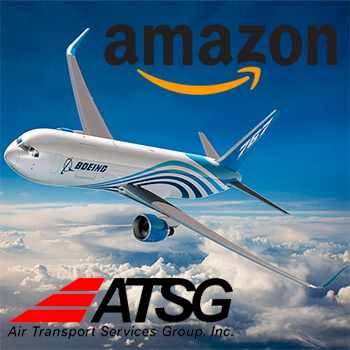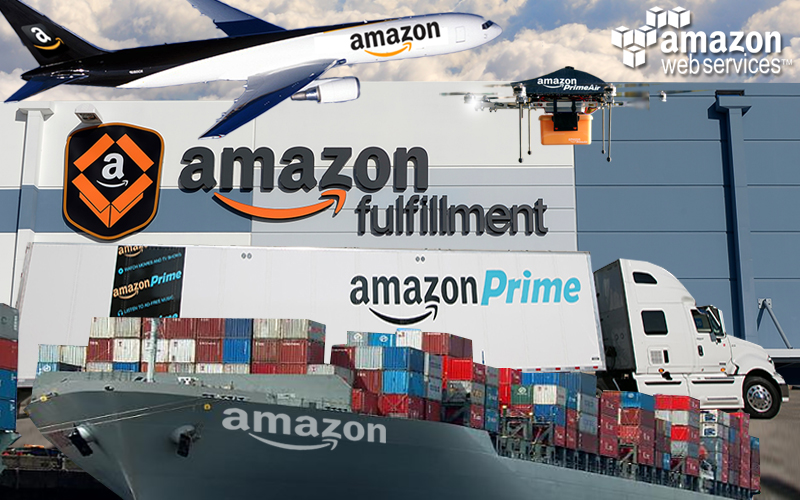Amazon and ATSG Ink Air Transport Network Deal
In a deal with potentially wide-ranging implications, Amazon fulfillment services, a subsidiary or e-commerce behemoth Amazon, has inked a deal with Air Transport Services Group (ATSG) in which ATSG will operate an air cargo network to serve United States-based customers.


Under the terms of the agreement, Amazon Fulfillment Services will lease 20 Boeing 767 freighter aircraft from ATSG’s Cargo Aircraft Management, with the aircraft operated by ABX Air and Air Transport International, ATSG’s airlines, with gateway and logistics services provided by ATSG’s LGSTX Services.
ATSG said the leases for the aircraft will range from five-to-seven years, and the agreement covering operation of the aircraft is for five years.
“Since last summer, we have been working closely with Amazon to demonstrate that a dedicated, fully customized air cargo network can be a strong supplement to existing transportation and distribution resources,” said Joe Hete, President and CEO of ATSG, in a statement.
“We are excited to serve Amazon customers by providing additional air cargo capacity and logistics support to ensure great shipping speeds for customers.”
And Dave Clark, Amazon senior vice president of worldwide operations and customer service, said Amazon is excited to supplement its existing network through this deal with ATSG to use these 20 aircraft to ensure air cargo capacity to support one and two-day delivery for customers.
This news comes at a time when Amazon has been front and center in regards to various reports suggesting it may increase its logistics and supply chain operations presence to meet high levels of demand as e-commerce activity continues to increase.
As previously reported in Logistics Management, UPS and FedEx handle the bulk of Amazon’s deliveries, but Amazon has attempted to take more control over its supply chain after a mixture of bad weather and a last-minute surge in e-commerce orders delayed deliveries during the crucial holiday season two years ago.
A Wall Street Journal report explained that while it would likely take years for Amazon to establish its own delivery network, Amazon is a “major customer for both UPS and FedEx, helping drive volume growth at the delivery giants. Nonetheless, investors also fear Amazon might have ambitions to someday become a competitor in the market, poaching customers from the delivery giants.”
Stifel analyst Dave Ross recently told Logistics Management that while his firm does not think Amazon will be a global integrator and offer its parcel delivery services broadly to others like UPS, FedEx, and DHL, it does believe Amazon will look to do more and more in-house each year, as its density grows.
And Shipware LLC President Rob Martinez, explained that Amazon is clearly going to make an impact on FedEx and UPS, but likely limited to a narrowly defined market segment.
“I’m not yet ready to believe that Amazon is looking to challenge the big two; but rather, handle some metropolitan shipments where it makes economic sense from a cost and service standpoint,” he said.
“In time, they will minimize their reliance on the national carriers. While Amazon sales make up nearly one quarter of all U.S. e-commerce sales, e-commerce is only a part of all the shipments handled by UPS and FedEx. And how much of its own business could Amazon handle on its own, 10 percent maybe? That’s not a big dent to FedEx and UPS, who continue to handle the other three quarters of U.S. e-commerce sales - and, by the way, the majority of Amazon deliveries.”
What’s more, Jerry Hempstead, president of Hempstead Consulting, said that the increasing pressure of the delivery commitment time has also put pressure of the integrators to devote significant air lift to Amazon to the point where the integrators don’t want or desire to devote their resources to satisfy the needs of one, demanding deeply discounted customer.
“The reality is that Amazon has needs, and they also have cost issues,” he said.
“The integrators may no longer desire to add operational costs at the price Amazon is willing to pay, (this is especially true for aircraft lift) and that leaves Amazon to build out their own network. Could they then offer some of those services to other companies who need transport? Perhaps, but the question becomes, would the integrators allow Amazon to try to cannibalize their current customers.”
“Would Amazon want other company’s packages compete for sales that Amazon could have achieved? Would offering service to third parties be a distraction to Amazon’s core vison? The good news for shippers is that the possibility of another service provider, even if it’s in the niche area of deferred residential deliveries is a good thing for everyone.”
Related: Amazon Logistics Services - The Future of Logistics?

Related White Papers
State of Online Freight Sales
While many business-to-business sales industries continue to expand sales online, the logistics industry has been slow to adopt online freight sales and booking, leaving ample space for ambitious forwarders to expand sales with new channels. Download Now
What Shippers Want
A roadmap for online freight services: Following suit from other industries, forward thinkers in the industry are already adopting online freight quotes and sales as a key differentiator, gaining an important competitive advantage in a crowded market space. Download Now

Article Topics
Latest in Materials Handling
Vehicle-mounted computers: Beyond rugged New packaging idea for the cold chain Autonomous mobile robots (AMRs) offer modern solution to challenges of traditional farming Hyster-Yale Group provides students with real-world AI experience in 2024 Kellogg Design Challenge KION Group’s board extends CEO Rob Smith’s contract by five years UniCarriers Forklift joins Quality Equipment in opening celebration of new location Largest Automate on record opens in Chicago on Monday May 6th More Materials HandlingAbout the Author
Subscribe to Materials Handling Magazine

Find out what the world's most innovative companies are doing to improve productivity in their plants and distribution centers.
Start your FREE subscription today.
April 2024 Modern Materials Handling

Latest Resources













